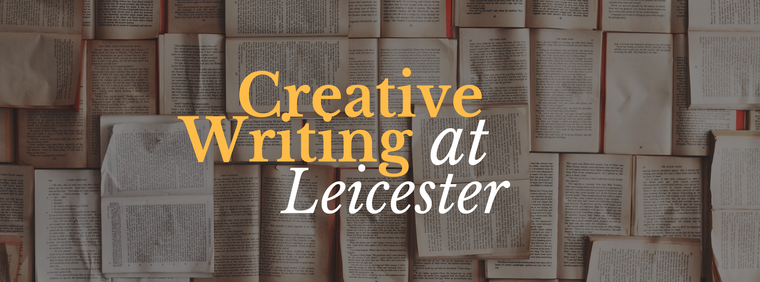It's been a few months since our last news post (which you can read here), so we thought it was time for an update, now we're at the end of the Spring term. There are some great news stories to share from Creative Writing and the Centre for New Writing. Wishing everyone a great Easter break!
General News from Creative Writing at Leicester
There have been some great events, guest talks and masterclasses at the University over the last few months. You can read about some of them here - and there are still more to come next term. Do take a look.
As part of this year's amazing Literary Leicester Festival, we ran our third annual Creative Writing Student Showcase. It was a lovely event, featuring brilliant readings from BA, MA, PhD Creative Writing students and graduates, including Beth Gaylard, Grace Klemperer, Hannah Mitchell, Lisa Williams, Kathy Hoyle, Jack Peachey, Laurie Cusack, Daneil Hibberd, Tracey Foster, Rob Reeves, Isobel Copley, Alexander Osani, Oleksandra Korshunova and Laura Besley.
The final results of the "Nature, the Environment & Sustainability" Short Story Competition were also announced at Literary Leicester Festival. Congratulations to joint winners Lee Wright and Sophie Sparham, as well as Alice Newitt who was specially commended, and runners-up Sam Dawson and Carol Rowntree Jones. Joint winner Lee Wright is a current PhD in Creative Writing at the University of Leicester, and Sam Dawson is one of our MA Creative Writing graduates. You can read about the final results on Creative Writing at Leicester here.
Congratulations to Creative Writing graduates Sam Bouch, Matt Walton, Nina Walker and all those involved in the writing and publication of the inaugural issue of Amateur Hour, a zine of poetry and prose by members of the eponymous writing group in Leicester. You can read more details about the zine on Creative Writing at Leicester here.
Thank you to all the Creative Writing students and graduates, Kristy Diaz, Georgia Sanderson, Kathy Hoyle, Laura Besley, Hannah Mitchell and Grace Klemperer, all of whom came to talk to our External Examiners, Chris Jones and Karen Stevens, on Monday 18 March. It was a really insightful and fascinating discussion.
Recently, our review website Everybody's Reviewing passed 375,000 readers and Creative Writing at Leicester is about to hit 250,000 readers. Our Facebook group has over 1,600 members. Thanks to all our contributors, authors, reviewers, editors, members, designers and readers!
Student News from Creative Writing at Leicester
On Tuesday 23 April, PhD Creative Writing student Joe Bedford will be appearing at Waterstones Cardiff, and again on Wednesday 24 April at The Tabernacle, Mumbles (Swansea), promoting his novel A Bad Decade for Good People (Parthian Books, 2023).
MA Creative Writing graduate Constantine is continuing his work as editor and co-founder of Coalville C.A.N. Community Publishing. The organisation is a resource for local writers, with special consideration given to neurodiverse and disabled writers and those from under-represented backgrounds. You can read a blog by Constantine here and can view Coalville C.A.N. Community Publishing's website here.
PhD Creative Writing graduate Laurie Cusack has had a beer (6.5%) named after his book, The Mad Road. The beer was sold at the Ale Stone Pub on Aylestone Road, Leicester, over Christmas. Proceeds went to the Emerald Centre in Leicester. Cheers, Laurie!
MA Creative Writing student Kristy Diaz will be co-authoring An Untold History of UK Emo (working title), to be published through independent record label Big Scary Monsters, anticipated release in 2025.
Congratulations to PhD Creative Writing graduate Tim Hannigan, whose book The Granite Kingdom was shortlisted for the Edward Stanford Travel Book of the Year 2024.
Congratulations to PhD Creative Writing student Kathy Hoyle whose story "Cockleshell Girl" is published in South Florida Poetry Journal here.
Congratulations to MA Creative Writing graduate Tionee Joseph whose work was featured at the International Working Class Story Festival at Upstairs at the Western and online on March 23rd-24th. The festival was a showcase of talent from working-class artists and academics in the UK, USA and Australia.
Congratulations to Grace Klemperer, BA English with Creative Writing student, who performed her poetry at the "Run Your Tongue" open-mic poetry evening in Leicester. This regular open-mic poetry evening is run and compered by PhD Creative Writing student Rob Reeves.
Congratulations to Creative Writing graduate Amrita Manku, whose play The Incident was performed at the Discovery Showcase Event at The Curve Theatre in Leicester on Friday 1 March. You can see more details here.
Amirah Mohiddin, PhD Creative Writing student, recently presented a conference paper at the Historical Fictions Research Annual Conference (2024), in Malmo, Sweden. Her paper was entitled "A Thousand and One Nights Meets Morocco’s Fight for Independence in a Historical Fantasy," and explored how Young Adult fantasy can be a powerful mode to decolonise history. The paper is linked with her practice-based research, where she is writing a YA fantasy novel interrogating storytelling as a mode of heroism and salvation. You can read more about Amirah's PhD here.
Congratulations to PhD Creative Writing graduate Karen Powell-Curtis, whose poem "Mary Wilson" has been published in the new issue of Allegro Poetry Magazine. You can read the poem here.
Congratulations to PhD Creative Writing student Jane Simmons whose poem "The Poet Writes an Abecedarian for her Maiden Aunt" won third prize in the Mslexia Poetry Competition.
Congratulations to Charlie Wilkins, MA Creative Writing student, whose latest novel, History Is a Haunted House, was recently published. You can read more about it here.
















